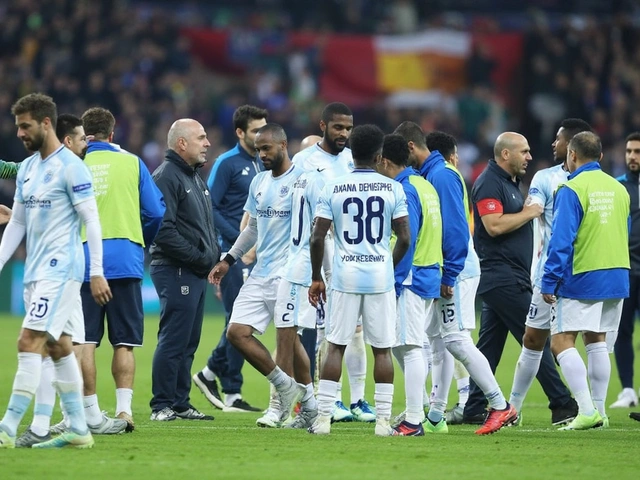What Happened During the Match?
The play between Galatasaray and Adana Demirspor was eagerly awaited by fans, but it took a dramatic turn when the Adana Demirspor team decided to leave the field after just 30 minutes. Up until that interruption, the game itself was intense, with its crescendo being Galatasaray's early lead. The game's most controversial moment occurred in the 12th minute when a penalty was granted to Galatasaray. Spanish striker Álvaro Morata converted this opportunity, nudging his team ahead with a 1-0 lead.
This decision was at the heart of the protest. Adana Demirspor players felt that the officiating was not impartial, leading to their abrupt exit from the pitch. Their coach was visibly frustrated by the perceived bias, tapping into a longer-standing dissatisfaction with refereeing in the league.
Reactions and Wider Implications
The walk-off was met with mixed reactions. Galatasaray coach Okan Buruk, while noting the intensity of the situation, conceded that the penalty decision might have been flawed. This moment in the match appeared as a tipping point, reflecting more profound issues in the Turkish football scene.
Following the match, Adana Demirspor's chairman, Bedirhan Durak, resigned, expressing his inability to work with unresolved grievances concerning the nation's refereeing committee and football federation. His resignation sent ripples through the Turkish football community. Observers viewed this as a broader cry against the perceived imbalances within the system.
Adding fuel to the controversy, Fenerbahçe vice-president Acun Ilıcalı stepped in, advocating for foreign referees for high-stakes matches, including major derbies. Ilıcalı's comments underline a growing sentiment among some clubs that international perspectives might bring fairness and neutrality to the games.
The episode is indicative of tumultuous times in Turkish football, where smaller clubs often feel marginalized by the top-tier decisions, leading to a persistent call for reforms. The incident between Galatasaray and Adana Demirspor is yet another chapter in the ongoing narrative of dissatisfaction in the league, with many waiting to see how the powers that be will respond.



Comments
What a rollercoaster! Fans felt the tension and the team showed heart. Let’s keep the spirit alive and push for fair play.
It’s a staged outrage to keep the elite clubs in power.
The incident underscores a systemic misalignment between officiating protocols and club expectations, a classic case of governance failure in a high‑stakes sporting ecosystem. When the arbiter’s decision matrix diverges from the perceived competitive equilibrium, stakeholder confidence erodes rapidly, prompting reflexive protest mechanisms. In this scenario, the premature exit by Adana Demirspor can be read as an orchestrated signaling event, leveraging the public arena to amplify grievances against the refereeing commission. Such tactics, however, risk entrenching a feedback loop where institutional inertia amplifies the very bias the protest aims to dismantle.
From a regulatory perspective, the league’s oversight body must recalibrate its adjudicatory frameworks, integrating transparent KPI dashboards that track decision consistency across matches. Incorporating advanced analytics-expected goal differentials, foul frequency heatmaps, and VAR intervention latency-could mitigate subjective bias. Moreover, stakeholder alignment workshops that bring together club execs, referees, and federation officials are crucial to co‑designing a revised code of conduct.
Operationalizing foreign referees, as suggested by external club executives, introduces a cross‑cultural calibration factor but also demands a robust onboarding pipeline to ensure procedural harmonization. The broader narrative, however, is not merely about one controversial penalty; it reflects a chronic perception of hierarchical marginalization among smaller clubs, a sentiment that fuels systemic destabilization if left unaddressed. An inclusive mentorship paradigm-where senior clubs mentor emerging ones on governance best practices-could serve as a catalyst for collective resilience.
Finally, the resignation of the club chairman signals a rupture point within the organizational hierarchy, necessitating succession planning that prioritizes ethical stewardship and transparent grievance redressal. Only through a multidimensional reform agenda-spanning procedural rigor, data‑driven oversight, and cultural integration-can the league restore its legitimacy and ensure that competitive outcomes are decided on the pitch, not in boardrooms.
I hear the concerns loud and clear and, honestly, it’s a chance for us to turn the tide with a positive mindset. While the criticism is valid, let’s also recognize the hard work that goes into organising these matches. By collaborating on transparent policies and keeping communication channels open, we can build a more trustworthy environment for everyone involved. Stay hopeful, stay engaged, and let’s push for those needed improvements together.
Reflecting on the recent upheaval, one cannot ignore the deeper philosophical undercurrents that shape our collective sporting psyche. The very act of walking off the field is a profound statement about agency, honor, and the social contract between clubs and governing bodies. It forces us to confront the inherent tension between institutional authority and individual integrity, a dialectic that has echoed throughout the annals of sport.
In asserting this protest, the players and management are not merely reacting to a single managerial blunder; they are challenging an entrenched paradigm that privileges certain interests over equitable competition. This assertiveness, while disruptive, is a necessary catalyst for systemic introspection, urging us all to re‑evaluate the criteria by which fairness is measured. Let us therefore embrace this moment as an opportunity for transformative dialogue, one that bridges the gap between policy and principle, and ultimately restores balance to the beautiful game.